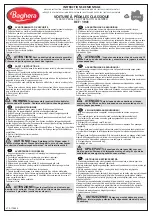
14
15
English
English
7
TOOL CHANGE
You can replace with bucket with the accompanying grabber.
1.
Unscrew the round bolt
(1H)
and remove it
(7A)
.
2.
Unscrew the nut on the square bolt
(1I)
and remove it
(7B)
.
3.
Remove the bucket
(7C)
.
4.
Screw on the lower section of the grabber. Ensure that the hole for the rectangular
bolt
(1I)
remains free
(7D)
.
5.
Fit the upper section of the grab bucket over the lower section and secure it with
the square bolt
(1I) (7E)
.
6.
Secure the square bolt
(1I)
with a nut
(7F)
.
Warning!
Do not over-tighten the nut.
Otherwise the grab bucket will not function!
7.
Re-insert the round bolt
(1H)
and secured it with a nut
(7G)
.
5
START PREPARATION
Always observe the sequence when
switching on
! When
switching off
, always switch
off the model before the transmitter. Otherwise, a control command can accidentally be
triggered and activate the model, which can lead to considerable damage.
1.
Set the transmitter
(2N)
ON/OFF switch to "ON"
(5A)
. The power LED
(2O)
on the transmitter blinks.
2.
Open the battery compartment.
3.
Insert the battery in the model. Insert the battery cable in the connection socket
on the model
(5B)
.
4.
Then switch the ON/OFF switch on the model
(1G)
to the 'ON' position. Once the
Power LED
(2O)
on the transmitter is continuously lit, the model is ready.
Switch off the model:
Then switch the ON/OFF switch on the model
(1G)
to the 'OFF' position. Remove the
battery from the model.
Switch off the transmitter:
Set the ON/OFF switch on the transmitter
(2O)
to the ‘OFF’ position.
4
CHARGING THE MODEL
Attention:
The battery and motor must cool down for 15 to 30 minutes before charging
and after every use. Otherwise they can be damaged. The charging process must be
constantlymonitored.Alwaysensurethatthechargingprocesstakesplaceonafireproof
surfaceinafire-resistantenvironment.
1.
Switch off the model and transmitter
(4A)
.
2.
Open the battery compartment. Remove the battery from the model.
3.
Plug the battery into the charging socket of the charger, ensuring correct polarity.
The battery must be gently inserted into the charging socket –
DO NOT USE FORCE
.
If the battery is not correctly inserted into the charging socket, the battery may
become damaged and, under certain circumstances, cause injury
(4B)
.
4.
Insert the USB charger in a free USB port; it will illuminate
(4C)
.
5.
The charging process is complete when the USB charger light starts blinking.
6.
Disconnect the battery from the USB charger and disconnect the USB charger from
the USB port once charging is complete.
The model can run for approx. 20 minutes after a charge time of approx. 200 minutes.
Warning:
The battery heats up while charging; this is normal. However, if it becomes
hot and/or changes to the surface begin to appear, stop the charging process immedi-
ately!
6
VEHICLE CONTROL
The left stick controls the left track; the right stick controls the right track.
6A
To drive forwards, carefully push both sticks forward. To drive backwards, carefully
push both sticks back.
6B
To turn left, carefully push the right stick forward and release the left stick. Operate
the controls the other way around to turn right.
6C
To rotate in place, carefully push one stuck forward and the carefully push the other
stick back. This works in both directions.
6D
With superstructure can be rotated approx. 300° anti-clockwise and clockwise with
buttons
2C
and
2D
.
6E
The main arm can be moved up and down with buttons
2E
and
2F
.
6F
The forearm can be moved up and down with buttons
2G
and
2H
.
6G
The bucket can be moved up and down with buttons
2I
and
2J
.
Overload safeguard:
All functions are equipped with a coupling that activates when
there is an excessive load (rattling noise) in order to prevent damage. This also takes
place if, for instance, the arm has been moved to the upper or lower limit. When this
occurs, stop steering in this direction.
Demo button:
The model demonstrates all of its functions. Stop the demo by pressing the button
again or initiating another control command.
Record button:
The model 'remembers' control commands that are issued after this button is pressed
instead of executing them immediately. Press the button again to execute the com-
mands. The process is ended with another control command.








































